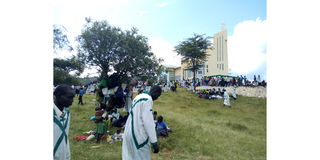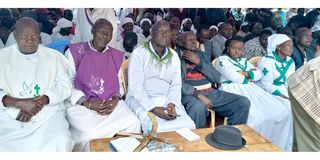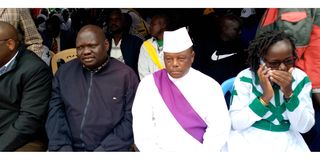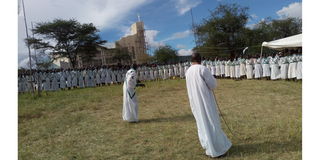Dini ya Roho: Pokot leaders to sue UK over historical injustices

Followers of Dini ya Roho Mafuta Pole Afrika at the church's New Jerusalem headquarters at Tamugh, Sook hills in West Pokot county.
What you need to know:
- On Sunday, the church held a ceremony in honour of the founder, Lukas Pkiech, who was killed on April 24, 1952.
- Pkiech was a significant political leader in colonial times and led the Pokot community against European colonisation that led to the Pokot resistance of the 1950s.
- West Pokot leaders say many followers of the religious groups were detained, others died and more went into exile and did not return.
Some leaders from the Pokot community have threatened to sue the British government for historical injustices perpetrated against followers of Dini ya Roho Mafuta Pole Afrika.
Dini ya Roho is an African church with deep roots in the community.
The leaders said followers of the religious group were massacred because the colonial government considered the denomination a sect and adherents clamoured for independence.
At least 400 people were slaughtered at Kolowo in Baringo, on the border with West Pokot County, according to church records. Many people were displaced and displaced from their land.
On Sunday, the church held a ceremony in honour of the founder, Lukas Pkiech, who was killed on April 24, 1952.
The event was attended by local political leaders, including former West Pokot governor Simon Kachapin and Kapenguria MP Samuel Moroto, who urged the government to address historical injustices that were perpetrated against locals.
Also present were West Pokot Deputy Governor Nicholas Atudonyang and Woman Representative Lillian Tomitom.

Former West Pokot Governor Simon Kachapin (center) with West Pokot Woman Representative Lillian Tomitom and religious leaders of Dini ya Roho Mafuta Pole Afrika at Keringet area in West Pokot county on Sunday April 24, 2022.
Pkiech was a significant political leader in colonial times and led the Pokot community against European colonisation that led to the Pokot resistance of the 1950s.
He led an underground religious group, mobilising the Pokot in campaigns against the colonial government.
West Pokot leaders claim the religious group faced opposition from subsequent administrations after independence because it was believed to be anti-government and was for many years not registered as a religious organisation.
Speaking at the event held in Keringet, Mr Moroto revealed that Pokot leaders are filing a case against the British government over historical injustices meted out by the colonial government on members of the group in the 1950s.
“The resistance by Pkiech led to his death and that of more than 1,000 Pokots in 1952 after they battled with the colonialists at Kolowa,” he said.

Kapenguria MP Samuel Moroto( centre) at a Dini ya Roho Mafuta Pole Afrika church function at Keringet area in West Pokot county on Sunday April 24, 2022.
The church, whose headquarters is in the Tamugh and Sook hills in West Pokot, enjoys a huge following, with more than 100,000 members in West Pokot, Baringo and parts of Uganda.
Politicians often flock to its churches to receive “spiritual blessings” during election campaigns.
Followers call it their "Jerusalem”, a place where they believe the Messiah, Jesus Christ, died and was resurrected.
The church was registered in 2012 after pressure from local leaders.
Local leaders are now demanding for the Pokot freedom fighters to be recognised just like the Mau Mau.
After independence, the church, founded in the 1950s by local Pokot who were against colonial rule, was declared a proscribed society and members had to operate clandestinely.
Mr Kachapin said many were detained, others died and more went into exile and did not return
The former Sports chief administrative secretary said communities in the region were marginalised and faced injustices but no one has bothered to address the issues.
He singled out Pkiech, the founder of Dini ya Roho, as a strong political leader in colonial times who led the Pokot community against British colonisation.
“Lukas resisted but up to now we don’t know where he was buried,” he said.

Choir members of Dini ya Roho Mafuta Pole Afrika practicing at the church headquarters at Tamugh, Sook Hills in West Pokot County.
Mr Kachapin observed that the historical injustices aggravated hatred and animosity among communities that still have border disputes.
“Our people went through the massacre in 1923 by colonialists and something must be done,” he said.
The lack of peaceful coexistence between communities, he said, had derailed development.
“There are so many land injustices in this region but the government is not committed to address the issues. This is a big challenge to development,” he said.
The former governor called on the government to compensate the Pokot who fought for independence, saying the community has a great historical significance and cannot be overlooked.
Mr Kachapin called on the area governor to track down and bring back the Pokot who fought for independence and went into exile in Lomesh, Uganda.
“Those who made sacrifices in Kenya to get independence are Pokots. Our people suffered and lost lives and property during that time,” he said.
Reconciliation, he said, will only come if historical injustices are addressed and justice served.
“We as Pokots have many land problems which need to be addressed,” he said, calling on the government to compensate those who suffered the atrocities.
“Residents are still living in abject poverty because of the atrocities that were meted on them.”





